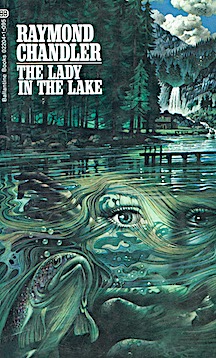The search for a perfume executive’s missing wife takes Philip Marlowe away from his normal stomping ground in either seedy Hollywood or corrupt Bay City (Chandler’s stand-in for the corrupt Santa Monica of his time). The change of scene, though only temporary, does him good. As his Chrysler ascends the mountain roads that lead him north of Los Angeles and toward the lake cabin where the missing women was last seen, Marlowe feels his spirit lift as well. At one point, he stops at a rundown outpost and says, “It felt like paradise.”  This moment of unaccustomed exuberance doesn’t last: At the lake, he happens upon a dead body, and that discovery leads him inexorably back to the big, bad city. But the literally breath-taking effect of his alpine idyll lingers. Despite its improbable, cantilevered plot, the story seems subdued—relaxed, even. Similes and other narrative contrivances fly with less abandon here than in previous Marlowe tales, and both the detective and his creator display a greater-than-usual mastery of situation as they move from one burnt-out soul to another, and from one violent encounter to the next. A well-done puzzle and a sprinkling of references to the world war that is unfolding in the background heighten the book’s appeal.
This moment of unaccustomed exuberance doesn’t last: At the lake, he happens upon a dead body, and that discovery leads him inexorably back to the big, bad city. But the literally breath-taking effect of his alpine idyll lingers. Despite its improbable, cantilevered plot, the story seems subdued—relaxed, even. Similes and other narrative contrivances fly with less abandon here than in previous Marlowe tales, and both the detective and his creator display a greater-than-usual mastery of situation as they move from one burnt-out soul to another, and from one violent encounter to the next. A well-done puzzle and a sprinkling of references to the world war that is unfolding in the background heighten the book’s appeal.
[ADDENDUM: Jacques Barzun and Wendell Hertig Taylor identified this work as “Chandler’s masterpiece” and selected it for their “Fifty Classics of Crime 1900–1950” series. They also labeled it an instance of “true detection” and argued that “Marlowe makes a greater use of physical clues and ratiocination in this exploit than in any other.” That lofty assessment aligns with my memory of The Lady in the Lake. (It’s a somewhat dim memory, to be sure: I read the book and jotted this brief review several years ago.) So I was intrigued to note that one Chandler enthusiast—Stephen Mertz, writing in The Mystery Fancier back in 1979—panned the novel in fairly blunt terms. “[F]or the most part the verve and spark of Chandler’s best work are sadly lacking,” Mertz wrote. He added: “The plotting, never Chandler’s strong point, is slipshod. … The solution itself makes not an iota of sense, raising far more questions than it answers.”
Perhaps these clashing views are not, ultimately, in contradiction. What Mertz disliked about the tale seems to match what Barzun and Taylor liked about it—namely, its use of structural elements that depart from the standard approach to plotting hardboiled private-eye stories. Michael Grost notes that The Lady in the Lake, “find[s] Chandler in Golden Age, puzzle plot territory, unraveling an intricately conceived, ingenious crime” that recalls the criminal schemes found in the work of Freeman Wills Crofts. (In his landmark essay “The Simple Art of Murder,” Chandler called Crofts “the soundest builder of them all when he doesn’t get too fancy.”) Grost, after criticizing the way that Chandler managed the book’s puzzle plot, suggests that the author “showed a good deal of entertaining ingenuity in the attempt” and praises him for “working a vein different from much of his regular style.”]
thegreencapsule
January 31, 2019 at 5:33 PM
I love the cover in your post. Is that a 70s era edition?
Mike
January 31, 2019 at 5:58 PM
The artist is Tom Adams, and I believe that this cover (like much of his other high-profile work) is indeed from the 1970s. He also did a slew of Agatha Christie covers.
Roger
January 31, 2019 at 6:48 PM
The other notable aspect of The Lady in the Lake is that one of the oddest films ever made was based on it. Robert Montgomery directed and starred as Marlowe and the whole film is shot – literally – from Marlowe’s viewpoint. The audience only sees what he sees. It’s an extra-ordinary feat of cinematic virtuosity, but a very bad film. A few minutes like that can be very effective, but a whole film…
Mike
January 31, 2019 at 7:22 PM
Thanks for your comment, Roger. I saw that film years ago. And, well, I haven’t had much of an urge to see it again. As you suggest, it’s a gimmicky effort that’s easier to admire than to enjoy.
Barry Ergang
February 2, 2019 at 5:38 AM
Not to mention that Montgomery as Marlowe was a triumph of miscasting.
Richard Robinson
February 1, 2019 at 10:16 AM
Though I don’t think this is near Chandler’s best, I like this one. Truthfully, I like the short story on which it’s based even better.
Mike
February 1, 2019 at 11:26 AM
I haven’t read the short works (including the story “The Lady in the Lake”) that Chandler scavenged for this novel. But I appreciate the tip, Richard. (On the whole, when I’ve dipped into Chandler’s pulp magazine stories, I haven’t enjoyed them in that way that I enjoy the book-length tales.)